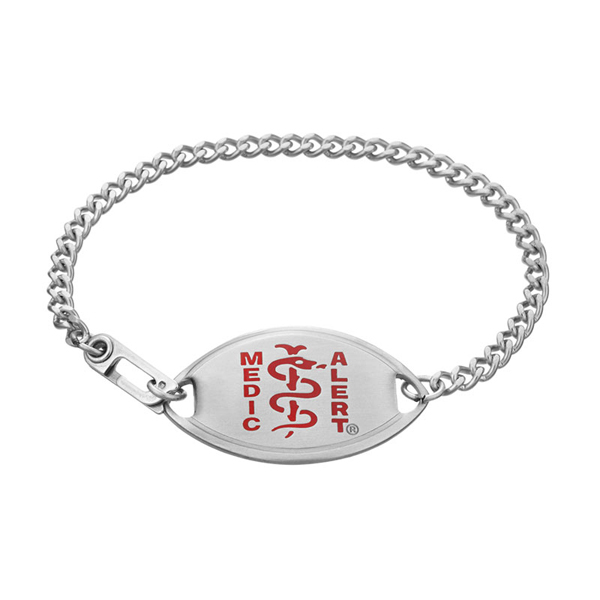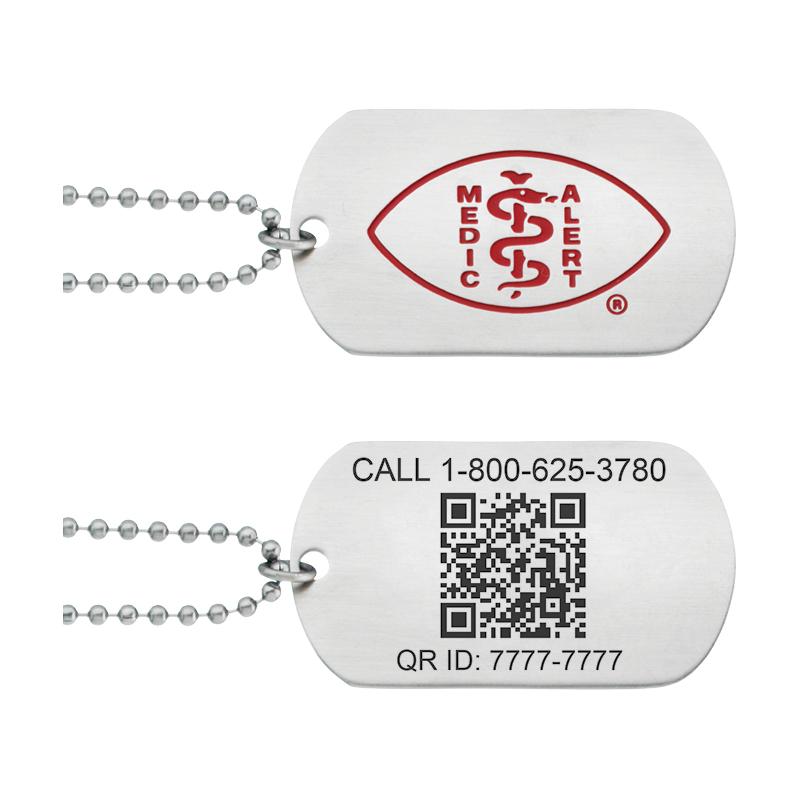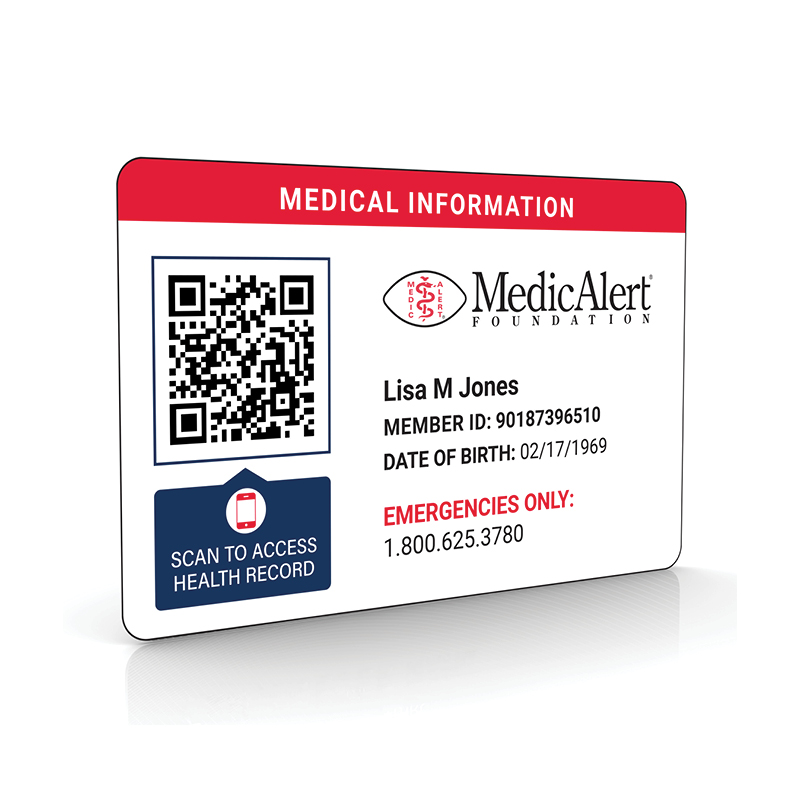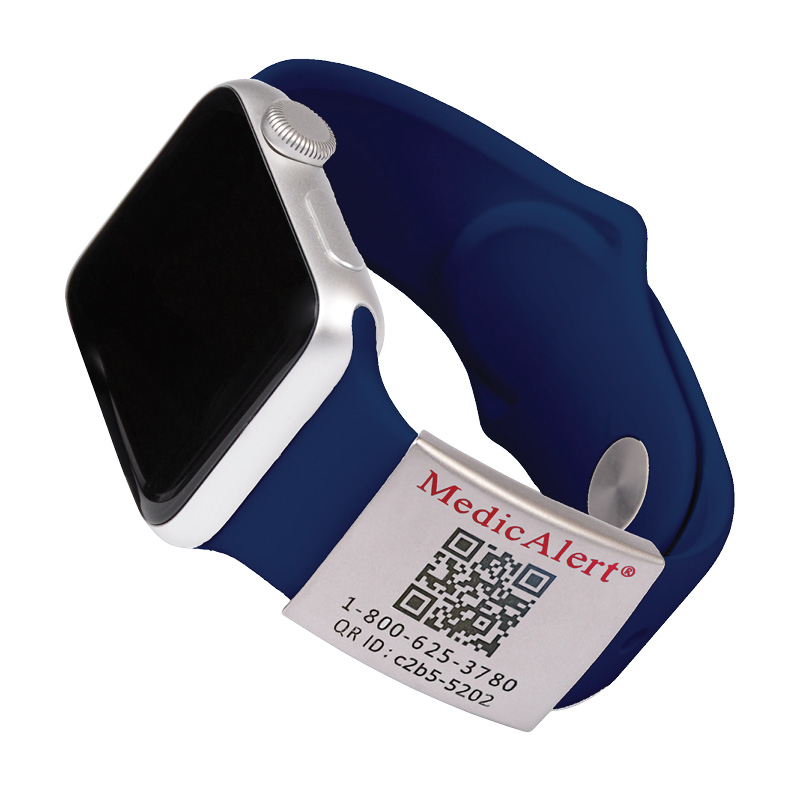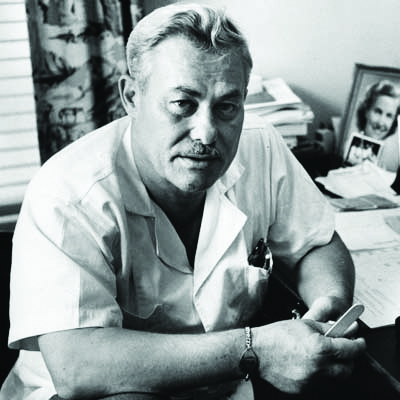
“I think I can save more lives with MedicAlert than I ever can with my scalpel.”
– Dr. Marion Collins, MedicAlert Founder
Celebrating MedicAlert Awareness Month
August is National MedicAlert Awareness Month. Founded in 1956, MedicAlert Foundation developed the first universal medical identification system. It all started with the simple idea that sharing critical medical information in an emergency could save and protect lives.
That idea has since grown into a multinational non-profit organization, helping save over 4 million lives.
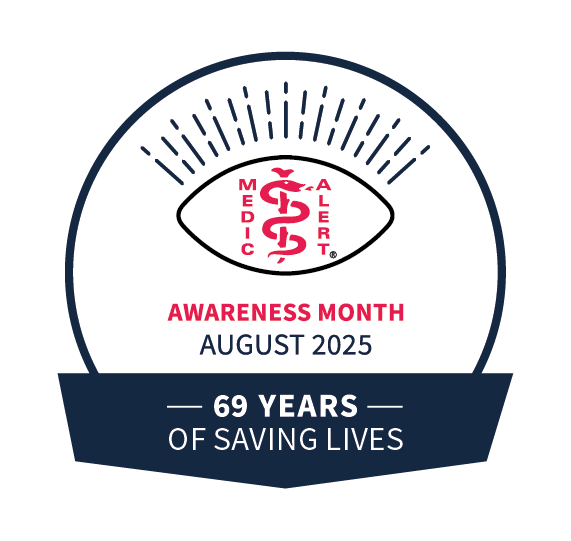
How does MedicAlert save lives?
Communicates your vital health details in an emergency - even if you can't speak for yourself
The inspiration for MedicAlert
In 1953, a 14-year-old girl cut her finger, deep enough to need stitches. When she arrived at the hospital, the attending physician took the normal course of action – administering a shot of tetanus antitoxin. Immediately after the injection, the girl went into anaphylactic shock and nearly died. She spent several days in a coma in the ICU. Fortunately she survived the incident, and five days later returned home unharmed.
That girl was Linda Collins, daughter of Dr. Marion and Chrissie Collins of Turlock, CA. Linda’s parents were on vacation abroad when this incident happened. Dr. Collins – a father and a physician – was especially affected by the crisis. You see, he knew of Linda’s life-threatening allergy. But when Linda couldn’t speak for herself, he wasn’t there to tell anyone about her allergy.
After this harrowing experience, Dr. Collins knew he needed a way to communicate Linda’s life-threatening allergy in an emergency. He understood that he couldn’t always be there to protect her, so he and Chrissie tried a few different things. In the beginning, they pinned a written note to her clothing. Later, they placed a paper bracelet on Linda’s wrist listing her allergies. The important thing was to avoid a recurrence of the incident that almost killed her – but these were temporary fixes.
The first MedicAlert ID
As Linda prepared to go away to college, Dr. and Mrs. Collins realized they needed a more durable solution. Dr. Collins commissioned a jeweler to create a medical identification bracelet for Linda. He designed the front to feature the staff of Asclepius, the Greek god of medicine. On either side of the staff, he added the words MEDIC ALERT in bright red to attract attention. On the back, he engraved Linda’s allergies and his phone number.
On campus at Stanford University, Linda’s bracelet drew a lot of attention. Her friends with their own medical conditions asked for personalized bracelets. That’s when a father’s simple idea to protect his daughter from a potentially fatal allergy started to take flight.
A physician himself, Dr. Collins quickly recognized that a medical ID could be a lifesaver for not just for people with severe allergies – but also for many other conditions such as asthma, diabetes, heart disease, seizure disorders, dementia, bleeding disorders, and many more.Realizing the potential of his idea, Dr. Collins said, “I think I can save more lives with MedicAlert than I ever can with my scalpel.”
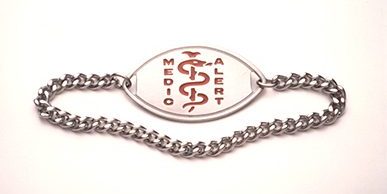
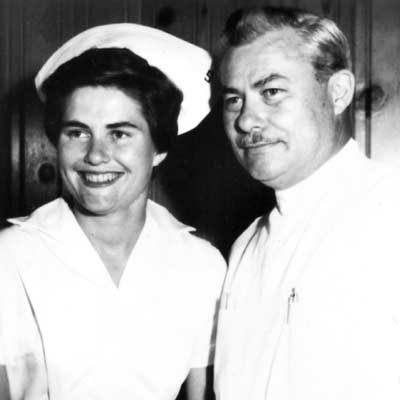
A new non-profit with a lifesaving mission
Dr. Marion and Chrissie Collins established MedicAlert as the first universal method of medical identification. MedicAlert’s mission, then and today, is simple: to save and protect lives by sharing vital medical information in emergencies.
By alerting first responders to a person’s allergies or chronic medical conditions, Dr. Collins knew it would improve their ability to provide fast, accurate care in an emergency.
The Collins family established MedicAlert Foundation as a non-profit charity, originally running the Foundation from their living room. Dr. Collins, Chrissie and Linda dedicated the rest of their lives to growing MedicAlert Foundation and spreading the word about the importance of medical identification.
From these humble beginnings, MedicAlert became the world’s most recognized medical ID symbol. It’s not an overstatement to say that MedicAlert changed the face of emergency medicine forever.
It was always important to the Collins family that MedicAlert be a non-profit, in order to stay focused on the mission. From the start, Dr. Collins declared, “We’re not here to make money. We’re here to save lives.”
The MedicAlert difference
As we celebrate MedicAlert Awareness Month, we want to shout from the rooftops about the importance of medical identification. But not all medical IDs are created equal. Here are five things that set MedicAlert apart from all other organizations that offer medical IDs.
1. We're the original medical ID.
MedicAlert literally invented the medical ID. Dr. Collins realized that medical identification would help both people with chronic disease and first responders achieve better outcomes in emergencies. MedicAlert’s founding in 1956 launched the medical identification industry.
MedicAlert is the organization known and trusted by first responders around the world; emergency personnel are trained to check for medical IDs because of Dr. Collins and MedicAlert.
2. Non-profit, both then and now.
MedicAlert is a 501(c)(3) non-profit; since the beginning, our singular mission has remained the same: to save and protect lives. All revenues received from donations, memberships, and the sale of medical IDs fund the delivery of life-saving services for first responders and people with chronic disease.
3. Your ultimate, comprehensive health profile.
MedicAlert’s member health profile was part of Dr. Collins’ original idea for the foundation. As a physician, he knew that the ID itself was important, but couldn’t always tell the patient’s whole story.
He designed a system where MedicAlert stored data on each person wearing a MedicAlert ID. After all, most engraved IDs only allow for a few lines of text. Beyond the initial information on the ID, MedicAlert’s health profile stores everything a first responder needs to know: medical conditions, allergies, medications, implanted medical devices, past surgeries, advance care directives, emergency contacts, and more.
In the beginning, these records were hand-written in thick log books, and the phones were answered by the Collins family in their living room. The health profiles were eventually digitized during the 70’s at the dawn of the computer age.
Today, MedicAlert stores member health profiles on state-of-the-art HIPAA-compliant servers, and users can easily update their profile at any time. Everyone with a MedicAlert ID has a unique member number that links to their profile in the database.
4. 24/7 live emergency support
From the start, the Collins family believed that the only way to provide protection was by offering round the clock support. Today, every MedicAlert ID has the phone number for MedicAlert’s hotline printed on it. MedicAlert’s 24/7 emergency response team is always on call for first responders, to make sure they have the information needed to make good decisions about their patient’s care.
In an emergency, first responders call MedicAlert’s toll free number and our emergency specialists relay all the important information about the MedicAlert member in their care. The team then sends the member’s health profile to the ER where the member is headed. And finally, MedicAlert personally calls the patient’s loved ones, so they aren’t alone in a crisis and their care is coordinated.
With the addition of our QR-code enabled medical IDs, emergency medical personnel can also scan the patient’s QR code for immediate access to their health details. It’s an even faster way to get to the information they need.
5. Free MedicAlert protection for those in need.
As a charity organization, our mission is to ensure everyone with a chronic illness is protected in an emergency. To that end MedicAlert provides custom medical IDs and annual memberships for people who need our service, but are facing financial hardship. Learn more and apply for the Free ID program.
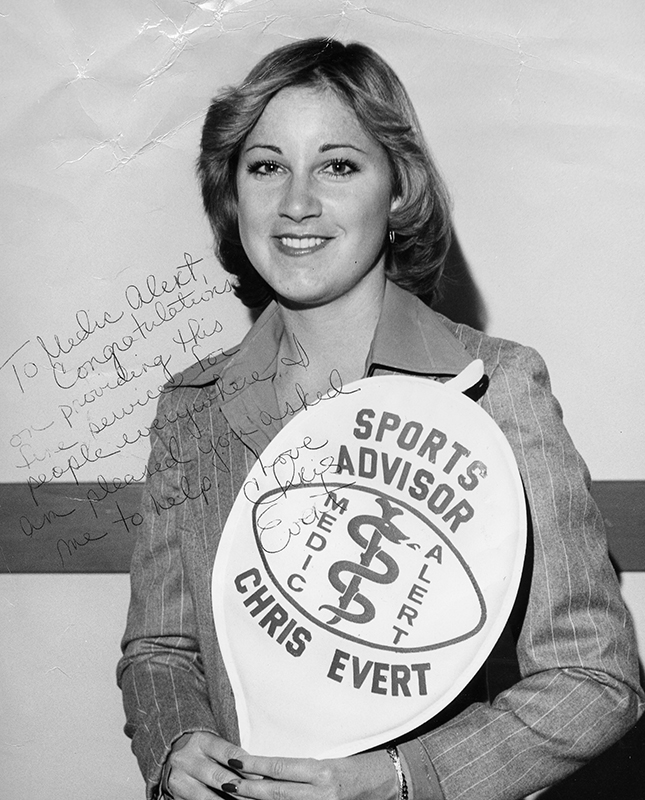
History of MedicAlert Awareness Month
A national movement to promote MedicAlert Awareness began in 1978. President Jimmy Carter honored MedicAlert Foundation for our contributions to public health by declaring the first National MedicAlert Week.
In 1996, in recognition of the Foundation’s 40th anniversary, California Governor Pete Wilson – along with Governors from 24 other states – proclaimed August as National MedicAlert Awareness Month.
This honor acknowledges MedicAlert Foundation’s innovation and dedication to protecting and saving lives, MedicAlert’s service providing help for people with unseen or special medical needs, and the importance of medical identification in improving public health.
MedicAlert fun facts
Some very famous faces have voiced their support of MedicAlert through the years, especially in the 70s and 80s. Actors, comedians, professional athletes, and performers have spoken about MedicAlert, endorsing us in public service announcements that appeared on national television and in print publications. A partial list includes Cher, James Earl Jones, John Ritter, Wayne Gretsky, Chris Evert, David Cassidy, Ed Asner, and Tony Randall. And the millionth MedicAlert bracelet ever produced went to none other than comedy legend Carol Burnett!
Another notable fact: Linda Collins’ very first MedicAlert bracelet is in the collection of the Smithsonian’s American Museum of History, acknowledging MedicAlert’s contribution to public health via the innovation of medical identification jewelry.
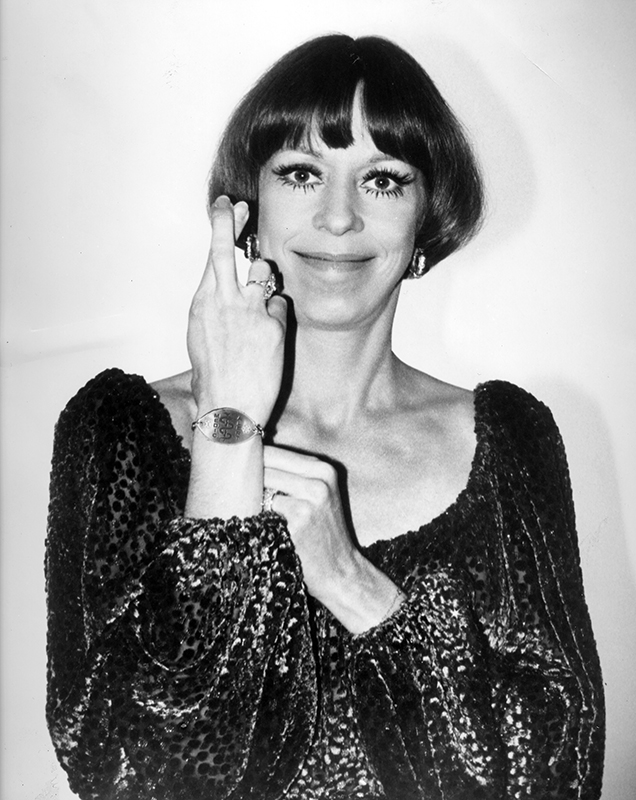
MedicAlert today - still leading
MedicAlert Foundation is proud that in our 69 years of service, we’ve helped save over 4 million lives. Now more than ever, we’re continuing to be a leader in public health.
How? We keep innovating. Did you know that MedicAlert offers the largest selection anywhere of QR code enabled ID products? When a first responder gets the health information they need with a quick QR code scan, it empowers them to deliver optimal care even faster.
We’re committed to protecting vulnerable populations. MedicAlert provides the only services focusing on protecting people with autism or Alzheimer’s if they wander from safety – a common and dangerous behavior for people with cognitive disabilities. A wandering incident that isn’t resolved in a few hours can result in injury or even death. Our Safe & Found™️ specialists work with local authorities to expand the search for wanderers, and ensure their safe return home.
In collaboration with the Sickle Cell Disease Association of America, we created a program using QR code medical IDs to improve the emergency room experience for people with sickle cell disease when they seek care for a sickle cell pain crisis. Sickle cell patients face a lot of hurdles to getting fast and effective care during a pain crisis – an excruciating experience that one participant said “feels like broken glass moving through my veins.” We’re proud to provide resources to help this underserved community get better, faster care.
Every day, we partner with community organizations to offer MedicAlert protection to people living with life-threatening illness – covering everything from asthma to von Willebrand disease. And we’re collaborating with other non-profits to pilot programs to improve quality of life for people living with chronic disease.
How you can participate in MedicAlert Awareness Month
At MedicAlert Foundation, we want everyone to understand the important of medical identification and how MedicAlert helps people with chronic illness. Here are some ways you can celebrate MedicAlert Awareness Month.
- Tell a friend or loved one about MedicAlert. It could save their life one day! Learn about the medical conditions where MedicAlert can make a difference for your loved one’s safety and peace of mind.
- Tell your community about MedicAlert. We have a full set MedicAlert Awareness Month Resources – badges, images, social media posts and lots of other material to make it easy.
Emphasize the importance of medical identification by featuring MedicAlert Awareness Month in your newsletter or website. - Make a gift to MedicAlert Foundation. As a registered 501(c)(3) charity, we rely on donations to deliver our 24/7 lifesaving services and provide sponsored services to people who need the protection of MedicAlert, but are facing financial hardship. Better yet, become a recurring donor to support our work year-round.
- Consider planned giving. The Collins family left an amazing legacy when they created MedicAlert Foundation. You can leave a legacy of your own with a planned gift to MedicAlert.
- Meet our members and see how MedicAlert changes lives.
- Share your story! We love hearing from our members how MedicAlert has made a difference in your life.
- Join our community on Facebook, Instagram, or LinkedIn. It’s where we share updates about new products and partnerships, as well as special member sales. Like and share our posts to help spread the word!
MedicAlert Awareness Toolkit
Click now for downloadable resources, shareables, materials, and more.
